- Home
- Cynthia Voigt
Seventeen Against the Dealer Page 2
Seventeen Against the Dealer Read online
Page 2
“Mina told me,” Maybeth explained. “It’s something called creole, from Louisiana. It sounded good, so I looked in a cookbook.”
“It is good,” Gram said. “Was it complicated?”
“No. Easy.”
“You think everything you cook is easy,” James said.
“Cooking is easy,” she agreed.
“Not if it’s hard for you,” James argued.
Maybeth thought about that. “But it’s not hard for me.”
James smiled, as if he’d known all along where this conversation would end up. And—being James—he probably had, Dicey thought. “That’s a lucky thing for us,” James told his sister.
Dicey was tired, good tired, from having ridden her bike across to the shop as soon as the light broke, from having worked a long day. She didn’t have the energy to do more than nod her agreement and eat on. She didn’t have to talk, anyway. They were all sitting at Gram’s table, in Gram’s home—their table in their home—and she was working her life out according to plan. She looked around at them all and the familiar gladness rose up inside her, like one of Maybeth’s cakes rising up fat and rich in the oven, smelling so good you could almost lick the air.
Maybeth and Sammy sat across from Dicey. You’d know they were brother and sister, just looking at them. They both had Momma’s golden hair and big eyes. Maybeth looked as if her face had been drawn with a finer pen than Sammy’s, and she was growing her heavy hair long so the curliness had smoothed into waves, but one look would tell you those two were related. James, beside Dicey, was as dark-haired and narrow-faced as she was. And they all—all four of the kids and Gram, too—had Tillerman eyes, hazel eyes where the colors mixed up greens and browns and yellows. The Tillermans looked like they belonged together, and that was a book you could judge by its cover.
Jeff, whose profile she could see beyond James, was a book you couldn’t judge by its cover—because he belonged, too, only not in the same blooded way. She watched his narrow wrist and the gray eyes you could look into and into and never touch bottom; she watched the way his hair, black as the water at night, fell down onto his forehead—cripes, Jeff was a treat to look at. Dicey couldn’t ever see Sammy’s chunky, sturdy body, even as big as he had grown, without wanting to hug him, and then pound small punches on his shoulder just to feel how strong he was, and then tickle him under the arms to watch his whole body collapse in laughing—but Jeff she could sit still and look at, for weeks, and never get tired of just seeing him, the way he moved and the way his skin had been laid out over his bones. Jeff was beautiful, inside and out; she’d always thought that, although she’d never let Jeff know she thought it. Jeff didn’t think of her as having thoughts like that, and she didn’t know how he’d react. Besides, he was right, most of her thoughts weren’t like that at all.
Dicey’s body relaxed as her stomach filled. Taking a forkful of vegetables, she thought about how the oregano in the green bean-tomato mix was sweet, and how its freshness made the vegetables taste fresher, too, and how Maybeth made up little packages of fresh herbs to sell at Millie Tydings’s grocery store, downtown. The packages sold for a dollar and a quarter, of which Maybeth got seventy cents. It didn’t sound like much, but it mounted up, over a growing season. The Tillermans knew how to bring money in, because they knew how to work. Dicey hesitated over her plate, wondering what to taste next, smiling to herself because she had so much to choose from, and picked up a slice of the crusty bread. She filled her stomach and listened.
Sammy would have gone on forever to Gram and Maybeth about some tennis camp he’d read about in the magazine Dicey had picked out for his Christmas stocking, somewhere in Arizona, where you did nothing all summer long but play tennis under coaches whose names Sammy seemed to know. But Gram held up her hand to silence him when she heard Jeff ask James, “I thought premed meant you took science courses, like organic chemistry, molecular biology, that kind of stuff. And what are you taking? Philosophy, art history, Shakespeare, geology. That’s not premed.”
“You forgot math.”
“And calculus,” Jeff added. “What does a doctor need with those?”
“My scholarship isn’t premed,” James reminded him.
“Your ambitions are,” Jeff answered. “I don’t understand what you’re up to. You tested out of all the distribution requirements with those AP exams.”
“I’m not ambitious.” James had his eyes fixed on his plate. It sounded almost like a quarrel he and Jeff were having; but what business did Jeff have quarreling with James?
Gram entered the conversation. “Yes, you are. Don’t try to fool us, young man. We’re your family.”
“Not the way Jeff means. I know people like Jeff means, and—Anyway, what’s the point of going someplace like Yale if you don’t—I mean, it’s this great liberal arts college, with a whole rack of good departments, not just a couple of strong ones—Why should I have to miss out on things just because I know what I ultimately want to specialize in?”
“Yeah.” Sammy backed his brother up.
Jeff raised both hands in self-defense. “Hey, I wasn’t saying you shouldn’t. I was just wondering why you are. I assume you have good reasons because you always do. You should know I’m assuming that, James.”
“I do,” James said. “I guess you touched a sore spot, because I’ve been wondering myself how much effect not taking those science courses might have, when I go for a med school scholarship. But, Jeff, it can’t be that doctors are allowed to know only about medicine. And they shouldn’t just know that, should they? I mean, if a doctor has wider knowledge he’ll be a better doctor for people—if he knows more about how people think, and are, about human beings, he’ll see things in a broader perspective, too, so he can really see people and not just—not just whatever their diseases are.”
Jeff studied James for a minute, then asked, “And you say you’re not ambitious?”
Their laughter rippled over the table, over the scrubbed wood and the plates and bowls. But, Dicey thought, too lazy to say it, she knew what James meant. The Tillermans weren’t ambitious. They wanted enough to take care of themselves, that was all. The Tillermans weren’t greedy, to be rich or to own things, or to be famous, either. They just wanted to be able to take care of whoever they were supposed to, just to earn a living—because your living wasn’t a present, it had to be earned. Even Momma had done that. She’d taken care of them until she couldn’t anymore. But until she couldn’t, she had done the best job she could, earning her living and theirs, too.
Dicey concealed the yawn that stretched her jaw muscles. She was feeling too good to want to be tired. She was too tired to eat any more, but she felt too good to want to leave the table, and the people. James talked on, getting excited.
“Did you ever take geology, Jeff? They measure things in billions of years, they round things out to the millionth—and they’re measuring time. The odd three thousand years don’t even matter, not in geological time.”
“I know,” Jeff said. “That’s why I’ve never taken it. That point of view terrifies me—no, it does—because all the things I care about don’t matter much, seen that way. It’s all just a series of destructions and erasures, and there’s so much lost . . . you know? So much just ended—and it’s worth keeping, treasures of mind or art and—lost.” He tried to shrug it off, with a movement of his shoulders. “And that scares me, I guess.”
“Not me,” Sammy announced. “I don’t believe in it anyway because—it’s always looking backward, all those billions of years backward. It’s already finished with.”
“I can’t imagine billions. Of anything,” Maybeth said.
“I can, millions,” Sammy said. “I can grasp things in millions, like millions of dollars, or potatoes. And miles, if you imagine space. Can’t you imagine millions of space miles?”
“Thousands,” Gram said. “That’s my outside limit. Dollars or potatoes or miles . . . and years, too. I can just about encompass a millennium. I
can line up millennia in my imagination, but I’m still only counting in thousands. Which, as far as I can gather from James, is about what most people can imagine, which seems appropriate for a Johnny-come-lately species like man. But it all makes me about too tired to think.”
“Yeah,” Dicey agreed. Gram’s eyes looked peaceful enough, and interested, but without any snap to them. “Yeah, I know. But I think I think in ones, anyway.”
“That doesn’t make sense,” Sammy protested.
Dicey shrugged. It probably didn’t, but it felt true.
“And the names,” James went on, ignoring what people said, as he often did when he was worked up about an idea. “Precambrian, Jurassic, Cenozoic—they’re such great names, heavy and thick, like layers of rocks resting on each other. You should have taken geology, Jeff. The dinosaurs, for example, they were around for one hundred and fifty million years. Man has been around for only, what? Maybe a million, give or take, and that’s just if you define man as a tool-making hominid. What we know about, recorded history, isn’t even ten thousand . . .” His voice trailed off as he thought about it. “And we think we’re so important.”
“Not important,” Jeff corrected him. “Particular, maybe. Different from any other creature.”
“What do you mean?” Sammy demanded. “That we’re really just like ants?”
“Worse,” James said. “Like caddis flies, that live only for a day, that have their whole lives in just one day.”
“But if you look at it that way, what does one life matter?” Sammy asked.
“Looked at that way, it doesn’t,” James said.
“Then how am I supposed to take mine?” Sammy asked. He glared at his brother. “Anyway, it’s not really true, or it’s not the only thing that’s true.” He thought some more. “And anyway, if it really doesn’t matter, then it doesn’t make any difference. I mean, it doesn’t matter that it doesn’t matter.”
That didn’t make much sense to Dicey, but James was just staring at Sammy. “Cripes, Sammy,” James asked, “how can you even think of wasting your life playing tennis?”
For a minute, Dicey thought Sammy might lose his temper. He’d grown tall, over six feet; exercise had given him thick muscles over his shoulders and chest; when he sat back, anger in his eyes, she thought it might be pretty lively if Sammy lost his temper. Then he shook his head, and grinned at James: “I’m not. And it’s not wasting, anyway, to do something well. You don’t think so, either, so don’t try to kid me. Otherwise, why aren’t you taking those straight premed courses?”
Dicey wished she had the energy to think about everything she was hearing and seeing. She was seeing, like dim, shadowy figures in a fog, the men her brothers were growing up into. They even looked a lot like men grown, at this point. She would have liked to get into the argument, because she had the feeling that she knew what her life was for. She had the feeling that what she knew and wanted was important. She was going to build boats, and she wasn’t going to let anything stand in her way. Not even geology. Thinking that, her head resting against the back of her chair and her legs stretched out under the table, Dicey smiled to herself. As if geology was actually trying to get in her way, as if geology—all those millions and billions of years piled up on each other—as if it was going to pay any attention to Dicey Tillerman at all.
“Are you two through eating yet?” Gram demanded. “Because I’m about as uncomfortable as I care to get in this chair, and your sister is slithering away under the table—”
Dicey sat up.
“Isn’t there dessert?” Sammy wondered.
“There’s leftover pie,” Maybeth told him. “But I thought we’d do the dishes first.”
Sammy groaned, but it was only a token protest. James reached out to serve himself another large spoonful of jambalaya, and Sammy groaned again. “If you’re not talking, you’re eating. I thought we were ready to finish.”
James ignored Sammy. “The courses I’m taking are fine, and I can pick up anything I need for premed later—except”—he put his fork into his mouth, chewed, swallowed—“I’m in trouble with the Shakespeare.”
“But, James,” Maybeth said, “you never have trouble in school. Are you worried?”
James nodded, and ate on. When he put his fork down, it was Maybeth he looked at. She was the easiest one of all of them to talk to, because she listened without interrupting—and that was because, Dicey thought, waiting to hear whatever it was James was going to say, Maybeth wasn’t sure she could understand. The rest of them were pretty sure they understood things, and that made them bad listeners. Sometimes.
Gram, for example, interrupted James before he could start. “It can’t be too serious,” she decided. “Is there any reason we can’t move into the living room? Where there are soft chairs and a fire burning. You didn’t let that fire burn out, did you?”
In the living room Dicey took one of the big pillows Maybeth and Gram had made out of scraps of fabric and lay down on her stomach, facing the fire. The pillow was soft under her elbows and chest. The fire glowed warm on her face, a bed of gray ashes mixed with red-hot coals, with the black, burned skeletons of logs lying across it.
Sammy piled wood on the fire. Lying there, Dicey watched the little blue flames come cradling up around the new logs. Lying there, she could listen to her family’s voices, and to the sounds they made shifting in their seats, and to the soft, plastic click of Gram’s knitting needles behind everything.
From what he was saying, it sounded like James didn’t know if he was going to pass the Shakespeare course, which would cost him his scholarship. Without that scholarship—which paid for everything, books, tuition, dormitory expenses—he couldn’t go to Yale.
“I don’t understand how you can be in trouble,” Jeff said.
“Because of the professor.”
“But, James,” Sammy protested, “teachers always like you, because you’re so smart.”
“It’s not that simple. It’s not as simple as a personality conflict.”
“And you like Shakespeare,” Jeff said.
“Let me explain,” James said. “See, Professor Browning—he’s one of the old professors. This is his last year, and he’s been teaching about ten years past retirement age because he really is good. He wanted to continue and they wanted him to. He’s one of those professors who went to Yale as an undergraduate, and got a Rhodes scholarship—you have to be terrific to get a Rhodes.”
“I know,” Jeff said. “Why doesn’t he like you?”
“But he does. That’s the trouble. And I think he’s good, too, and I like him.”
“Then what’s the problem?” Sammy asked. “You aren’t making sense.”
“The problem is . . . See, the course started out with the comedies. I did well because, well, the way Professor Browning looks at things, his worldview, is a lot like the comedies. The way the comedies say nothing is real or true, or trustworthy. Like, at the end of Twelfth Night, when the duke finally falls in love with Viola. You wanted that to happen, right? It was what would happen in a well-ordered universe, so you believe it. But if you think about it, there’s no good reason, and the duke had said all during the play he’d always love Olivia . . . and Olivia had married Sebastien thinking he was Viola, whom she’d fallen in love with at first glance, thinking she was a boy and—all the couples, even Sir Toby and Maria, end up married, the way we feel they ought to, but—it’s all chance. The whole play argues that love is irrational. You can’t rely on it.”
“I see how he’s reading it,” Jeff said. That was lucky, because Dicey knew the title but she’d never had time to read the play, even if she’d wanted to. Jeff could talk with James about this better than she’d ever be able to.
“Professor Browning cares about how I do, and what I think of the course. More than that, he really believes literature is important, not just because he teaches it, but because if people read and feel and think, they live better lives. Just because he isn’t what he used to
be, that isn’t his fault. Just because he’s old.”
“Watch how you use that word,” Gram warned him.
“You aren’t old,” James told her. “Professor Browning is kind of—crumbling at the edges of his mind? The trouble I’m in is—now we’re talking about the tragedies, and will be for the rest of the year, and he has exactly the same way of thinking about them—as if they uncreate, destroy, make chaos. But there’s more to them, you know? Always, at the end, the world of the play is made better, even though the individual is—lost. But if I think and write about the tragedies as having this re-creation aspect, I’ll fail the course.”
“He’ll fail you because you don’t agree with him?” Sammy said.
“I didn’t say he was perfect. I said he’s crumbling.”
“I can sympathize with all that crumbling,” Gram said.
“That’s really dumb,” Sammy told Gram, “and you know it. Let James talk, Gram, and stop trying to grab all the attention.”
“I wasn’t,” Gram sputtered, “I don’t—” Dicey turned her head and caught, as she thought she would, her grandmother’s sudden smile. Sammy sat on the arm of Gram’s chair, just grinning down at her, teasing. “That reminds me, Dicey,” Gram said, “that man, Ken, from Annapolis called. He wants you to call him back.”
“Okay, thanks.” Ken Forbeck was a ship’s carpenter who kept his eye out for wood; he knew Dicey was interested in becoming a boatbuilder. Tomorrow was a holiday, but she could call him the next day and find out what he wanted, find out if he had some wood for her to look at.

 The Runner
The Runner By Any Name
By Any Name Bad Girls, Bad Girls, Whatcha Gonna Do?
Bad Girls, Bad Girls, Whatcha Gonna Do?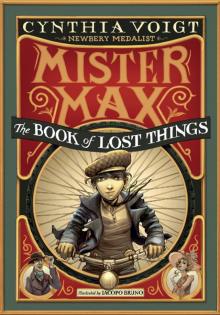 Mister Max: The Book of Lost Things: Mister Max 1
Mister Max: The Book of Lost Things: Mister Max 1 The Wings of a Falcon
The Wings of a Falcon Bad Girls in Love
Bad Girls in Love Toaff's Way
Toaff's Way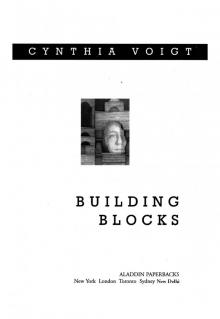 Building Blocks
Building Blocks Orfe
Orfe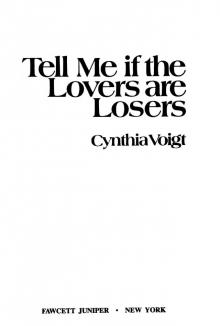 Tell Me if the Lovers Are Losers
Tell Me if the Lovers Are Losers It's Not Easy Being Bad
It's Not Easy Being Bad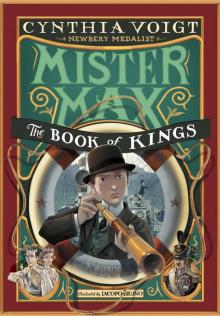 The Book of Kings
The Book of Kings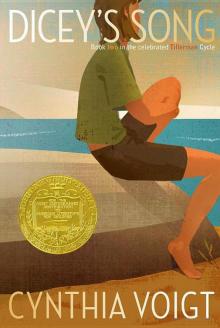 Dicey's Song
Dicey's Song A Solitary Blue
A Solitary Blue Tree by Leaf
Tree by Leaf Sons From Afar
Sons From Afar Teddy & Co.
Teddy & Co. Jackaroo
Jackaroo Elske
Elske Izzy, Willy-Nilly
Izzy, Willy-Nilly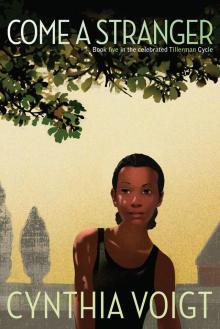 Come a Stranger
Come a Stranger Mister Max: The Book of Secrets: Mister Max 2
Mister Max: The Book of Secrets: Mister Max 2 Seventeen Against the Dealer
Seventeen Against the Dealer The Callender Papers
The Callender Papers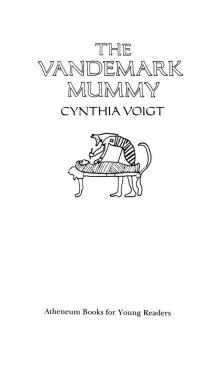 The Vandemark Mummy
The Vandemark Mummy Tale of Birle
Tale of Birle Glass Mountain
Glass Mountain The Tale of Oriel
The Tale of Oriel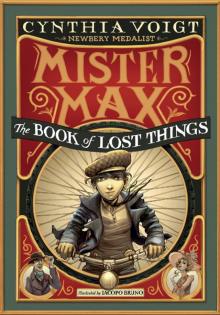 The Book of Lost Things
The Book of Lost Things The Book of Secrets
The Book of Secrets Tale of Gwyn
Tale of Gwyn